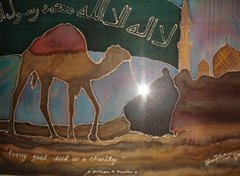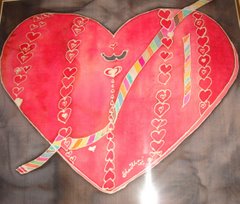
Ft17-
KUFR AND ITS TYPES
The following information was excerpted from the appendices to the English translation of Tafseer Ibn Katheer.
The Qur’an uses the word Kufr to denote people who cover up or hide realities.
The Qur’an uses this word to identify those who denied Allah’s favors by not accepting His Dominion and Authority. (Major Sin)
Kufr thus is an antonym for Emaan or Disbelief in Allah and a Kaafir is a non beliver.
This type of Kufr is called AL-KUFR UL AKBAR or major kufr.
There are many types of Al-Kufr ul Akbar:
The following information was excerpted from the appendices to the English translation of Tafseer Ibn Katheer.
The Qur’an uses the word Kufr to denote people who cover up or hide realities.
The Qur’an uses this word to identify those who denied Allah’s favors by not accepting His Dominion and Authority. (Major Sin)
Kufr thus is an antonym for Emaan or Disbelief in Allah and a Kaafir is a non beliver.
This type of Kufr is called AL-KUFR UL AKBAR or major kufr.
There are many types of Al-Kufr ul Akbar:
Types of Al-Kufr ul Akbar
1.) Kufrul-‘Inaad: Disbelief out of stubbornness. This applies to someone who knows the truth and admits to knowing the truth and admits to knowing it with his tongue, but refuses to accept it and refrains from making a declaration. Allah (swt) says: “Throw into Hell every stubborn disbeliever.” (Surah Qaaf /24)
Example: Abu Talib, the Messenger (saw) uncle.
2.) Kufrul-Inkaar: Disbelief out of denial. This applies to someone who denies with both heart and tongue. Allah (swt) says: “They recognized the favors of Allah, yet they deby them. Most of them are disbelievers.” (Surah Nahl/83)
Example: All Idolaters
3.) Kufrul-Kibr: Disbelief out of arrogance and pride.
Example: The disbelief of devils (Iblees).
4.) Kufrul-Junood: Disbelief out of rejection. This applies to someone who acknowledges the truth in his heart, but rejects it with his tongue. This type of kufr is applicable to those who calls themselves Muslims but who reject any necessary and accepted norms of Islam such Salaat and Zakat. Allah (swt) says: “they denied them (Our Signs) even though their hearts believed in them, out of spite and arrogance.” (Surah Naml/14)
5.) Kufrul-Nifaaq: Disbelief out of hypocrisy. This applies to someone who pretends to be a believer but conceals his disbelief. Such a person is called a MUNAFIQ or Hypocrite. Allah (swt) says: “Verily the hypocrites will be in the lowest depths of Hell. You will find no one to help them.” Surah An Nisaa/145)
6.) Kufrul-Istihaal: Disbelief out of trying to make HARAM to HALAL. This someone who accepts as lawful (halal) that which Allah has made unlawful (Haram) like alcohol or adultery. Only Allah (swt) has the prerogative to make things Halal and Haram and those who seek to interfere with His right are like rivals to Him and therefore fall outside the boundaries of faith.
7.) Kufrul-Kurh: Disbelief out of detesting any of Allah (swt) commands. Allah (swt) say: “Perdition (destruction) has been consigned to those who disbelief and He will render their actions void. This is because they are averse to that which Allah has revealed so He has made their actions fruitless.” (Surah Muhammad/8-9)
8.) Kufrul-Istihzaha: Disbelief due to mockery and derision. Allah (swt) says: Say: “Was it at Allah, His signs and His Angels and His apostles that you were mocking? Make no excuses. You have disbelieved after you have believed.” (Surah Tawba/65-66)
9.) Kufrul-I’raadh: Disbelief due to avoidance. This applies to those who turn away and avoid the truth. Allah (swt) says: “And who is more unjust than he who is reminded of his Lord’s signs but then turns away from them. Then he forgets what he has sent forward (for the day of Judgement)” (Surah Kahf/18 and 57)
10.)Kufrul-Istibdaal: Disbelief because of trying to substitute Allah’s Laws. This could take the form of: a.)Rejection of Allah’s law (Sharee’ah) without denying it.
b.) Denial of Allah’s law and therefore rejecting it. Or
c.) Substituting Allah’s laws with a man-made laws. Allah (swt) says: “Or have they partners with Allah who have instituted for them a religion which Allah has not allowed.” (Surah shuraa/8). Allah (swt) says: “Say not concerning that which your tongues put forth falsely (that) is lawful and this is forbidden so as to invent a lie against Allah. Verily, those who invent a lie against Allah will never prosper.” (Surah Nahl/116).
4.) Kufrul-Junood: Disbelief out of rejection. This applies to someone who acknowledges the truth in his heart, but rejects it with his tongue. This type of kufr is applicable to those who calls themselves Muslims but who reject any necessary and accepted norms of Islam such Salaat and Zakat. Allah (swt) says: “they denied them (Our Signs) even though their hearts believed in them, out of spite and arrogance.” (Surah Naml/14)
5.) Kufrul-Nifaaq: Disbelief out of hypocrisy. This applies to someone who pretends to be a believer but conceals his disbelief. Such a person is called a MUNAFIQ or Hypocrite. Allah (swt) says: “Verily the hypocrites will be in the lowest depths of Hell. You will find no one to help them.” Surah An Nisaa/145)
6.) Kufrul-Istihaal: Disbelief out of trying to make HARAM to HALAL. This someone who accepts as lawful (halal) that which Allah has made unlawful (Haram) like alcohol or adultery. Only Allah (swt) has the prerogative to make things Halal and Haram and those who seek to interfere with His right are like rivals to Him and therefore fall outside the boundaries of faith.
7.) Kufrul-Kurh: Disbelief out of detesting any of Allah (swt) commands. Allah (swt) say: “Perdition (destruction) has been consigned to those who disbelief and He will render their actions void. This is because they are averse to that which Allah has revealed so He has made their actions fruitless.” (Surah Muhammad/8-9)
8.) Kufrul-Istihzaha: Disbelief due to mockery and derision. Allah (swt) says: Say: “Was it at Allah, His signs and His Angels and His apostles that you were mocking? Make no excuses. You have disbelieved after you have believed.” (Surah Tawba/65-66)
9.) Kufrul-I’raadh: Disbelief due to avoidance. This applies to those who turn away and avoid the truth. Allah (swt) says: “And who is more unjust than he who is reminded of his Lord’s signs but then turns away from them. Then he forgets what he has sent forward (for the day of Judgement)” (Surah Kahf/18 and 57)
10.)Kufrul-Istibdaal: Disbelief because of trying to substitute Allah’s Laws. This could take the form of: a.)Rejection of Allah’s law (Sharee’ah) without denying it.
b.) Denial of Allah’s law and therefore rejecting it. Or
c.) Substituting Allah’s laws with a man-made laws. Allah (swt) says: “Or have they partners with Allah who have instituted for them a religion which Allah has not allowed.” (Surah shuraa/8). Allah (swt) says: “Say not concerning that which your tongues put forth falsely (that) is lawful and this is forbidden so as to invent a lie against Allah. Verily, those who invent a lie against Allah will never prosper.” (Surah Nahl/116).
The Difference Between Shirk and Kufr
Any person who rejects the total religion of the Prophet is a Kafir and one of the ways in which a person rejects the message of the Prophet (saw) is by committing Shirk
Therefore every single act of Major Shirk is a type of a Kufr, but not every single type of Kufr involves Shirk.
Any person who rejects the total religion of the Prophet is a Kafir and one of the ways in which a person rejects the message of the Prophet (saw) is by committing Shirk
Therefore every single act of Major Shirk is a type of a Kufr, but not every single type of Kufr involves Shirk.
Thus Kufr is the general name given to any act, statement or belief that might expel a person from the fold of Islam and Shirk is the most common and evil form of Kufr.
Many acts have elements of both Kufr and Shirk in them, even though each act might be more representative of one of these two matters.






